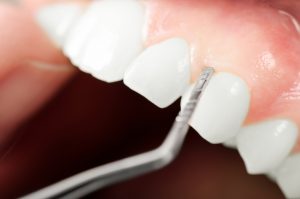 Caring for your teeth and gums is one of the most challenging things pertaining to your oral health. Many people neglect some of the things that could prevent serious infections from occurring. Periodontal disease is commonly referred to as gum disease, and it is a serious infection that could lead to tooth loss. Philadelphia periodontist Dr. Brown has specialized training in periodontal treatments and can aid in reversing gum disease before it gets to the point where tooth extractions are necessary. If you need periodontal disease treatment in Philadelphia, we encourage you to contact our office to schedule a consultation today.
Caring for your teeth and gums is one of the most challenging things pertaining to your oral health. Many people neglect some of the things that could prevent serious infections from occurring. Periodontal disease is commonly referred to as gum disease, and it is a serious infection that could lead to tooth loss. Philadelphia periodontist Dr. Brown has specialized training in periodontal treatments and can aid in reversing gum disease before it gets to the point where tooth extractions are necessary. If you need periodontal disease treatment in Philadelphia, we encourage you to contact our office to schedule a consultation today.
Understanding Periodontal Disease
Periodontal disease refers to a bacterial infection around the gums and bones supporting the teeth. Periodontal disease can impact one tooth, or multiple teeth. Tooth loss is common when periodontal disease spreads to multiple teeth, causing intense pain and serious infections. Periodontal disease begins when there is too much bacteria in the mouth, leading to a buildup of plaque. Plaque causes the gums to become inflamed and you may notice bleeding when you brush your teeth along with pain throughout the day. In the early stages of periodontal disease, most patients do not feel any pain and four out of five people with periodontal disease do not realize they have it.
Signs of Periodontal Disease
How do you know if you are dealing with periodontal disease? There are some early warning signs to watch closely. If the issues below do not start to heal with healthier eating, brushing, and flossing, it is time to call Dr. Brown. Here are some symptoms to watch for:
- Bleeding gums
- Red, swollen or tender gums
- Receding gums or gums that start to pull away from the teeth
- Loose and separating teeth
- Consistent sores in the mouth
- Consistent bad breath
- Problems with teeth alignment when chewing
The teeth and gums need to be cleaned effectively in order to remove the bacteria from the mouth properly to prevent tooth loss. Failure to treat gum disease can lead to additional health conditions. Early treatment is vital to protect your teeth and gums!
Treating Periodontal Disease
The most important step you can take when trying to prevent periodontal disease is to practice daily brushing and flossing. Reducing the amount of bacteria in the mouth is critical to healthy teeth and gums. We recommend annual dental cleanings to remove plaque around the teeth and below the gums. If you are dealing with an advanced stage of periodontal disease, contact us immediately for effective periodontal disease treatment in Philadelphia.
